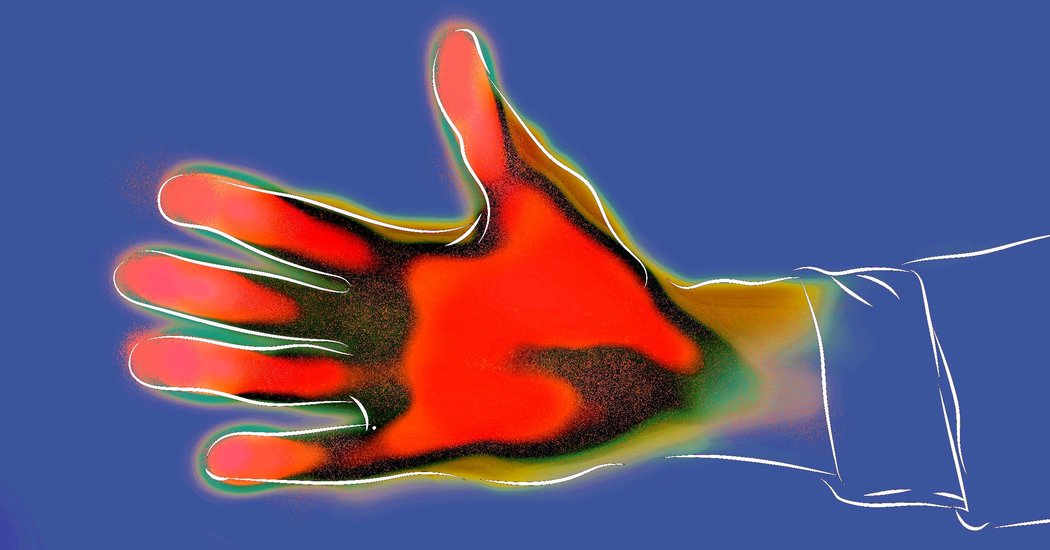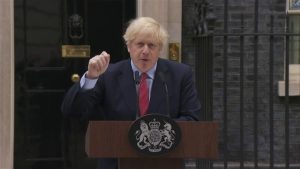Handshaking for self-protection became anachronistic long before Dr. Anthony Fauci, the nation’s leading infectious-disease expert, said wistfully in early April that as far as even greeting one another, “we may never shake hands again.” As a personal defense mechanism and for sealing deals, though, it was outdated as soon as people began openly brandishing guns and hiring lawyers to vet contracts.
Habits are hard to break, however. We still hear “Bless you” in response to sneezes, although hardly anyone still believes Pope Gregory’s guidance that the expression would help ward off the plague. Also, this is not the first time in our history that an epidemic has weaponized a custom that originated as a means of assuring two strangers that neither was armed. After the 1793 yellow fever epidemic in Philadelphia, the publisher Matthew Carey wrote, “The old custom of shaking hands fell into such general disuse, that many shrank back with affright at even the offer of the hand.”
“How did people first get into the habit of shaking hands?” Harper’s Weekly asked in 1870, and then answered: “In early and barbarous times, when every savage or semi-savage was his own lawgiver, judge, soldier and policeman” two strangers would offer each other their right hand — “the hand alike of offense and defense”— in order “to show that the hand was empty, and that neither war nor treachery was intended.”
Knights incorporated the practice into chivalry, although when removing their iron mail gauntlets proved too cumbersome, personal rectitude had to be assumed as a matter of faith.
The greeting was ritualized as expected gamesmanship and political etiquette between competitors in sports and politics, immortalized in contrived photo ops of movers and shakers, and became common to everyday encounters.
While handshaking did not outwear its welcome, it never implied an enduring friendship. Instead, it suggested a modicum of trust — not implicitly, but only after both parties proved that, literally, they weren’t holding anything back.
Historians say that the custom probably spread from Europe, often by missionaries. Fijians originally preferred to sniff each other than to shake hands, and experts on interpersonal relations today maintain that smell, too, remains part of the process. Elsewhere, bowing (preferred by, among others, George Washington) stubbornly persisted until handshaking caught on. Among Orthodox Jews and many Muslim cultures, men refused — and still do — to shake hands with women. In Germany, substituting the outstretched right arm for the handshake in a Nazi salute during the 1930s established a common ground between two individuals but affirmed their loyalty to Hitler, not to each other.
What began in prehistoric times as a strategy of self-preservation had by the mid-19th century spawned an abundance of how-to guides on the etiquette of handshaking. A woman’s vigorous shaking of a man’s hand, Harper’s cautioned, might be misinterpreted (“it is for them to receive homage, not to give it”). Early in the 20th century, Professor J. Franklin Jameson, the chairman of the history department of the University of Chicago, advised that a gentleman should shake a lady’s hand only if she extends hers, that he should rise from his seat and remove his glove first and that while a “listless cold hand” is repellent, “there need not be such an extension as that from a catapult, nor a grip or squeeze sufficient to make one cry aloud with pain.”
Since then, the choreography of greeting and congratulation has grown even more elaborate, with fist bumps and other gestures (prompting Phil Rizzuto, the Yankee shortstop, to say: “I’m glad I don’t play anymore. I could never learn all those handshakes”).
Some people, by profession, have always been better at it than others. “Politicians, if they are running for office, have the art of handshaking to perfection,” Harper’s wrote in 1855. (After injuring his finger, a French consul was awarded $60,000 in damages from a trucking company in 1959 after proving that handshaking was integral to his career as a diplomat.) President Trump, an acknowledged germaphobe, is an exception, although it’s unimaginable that he would adopt an earlier recommendation by the French Academy of Medicine that the Gallic-kiss on each cheek is more hygienic than the chillier Nordic hand-pumping.
Still, there remains something gripping about a handshake, as a personal totem and symbolically. Think Yitzhak Rabin and Yasir Arafat clasping hands in 1993 on the White House lawn. Or Hitler refusing to shake Jesse Owens’s hand at the 1936 Olympics. Or Mr. Trump spurning Nancy Pelosi’s.
A grasp that’s indiscriminate can be fraught, too. Remember when President Ronald Reagan was greeting guests on a receiving line and mistook his only black cabinet member, Samuel R. Pierce Jr., for a mayor? Or when Abe Beame, New York’s mayor, was almost photographed congratulating David Berkowitz, the accused Son of Sam killer, at Police Headquarters because he confused him with a detective?
“In no one external circumstance of life, is a man or woman’s character more clearly discerned than in the mode of salutation by the hand,” William Kidd wrote in his journal for “inter-communications” in 1852.
Al Capone once noted that an extended hand is a powerful tool in an argument, but it will take you only so far. “You accomplish more with a smile, a handshake and a gun,” he famously said, “than you do with just a smile and a handshake.”
The Times is committed to publishing a diversity of letters to the editor. We’d like to hear what you think about this or any of our articles. Here are some tips. And here’s our email: [email protected].
Follow The New York Times Opinion section on Facebook, Twitter (@NYTopinion) and Instagram.



















